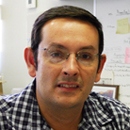Academic Editors
The following people constitute the Editorial Board of Academic Editors for PeerJ. These active academics are the Editors who seek peer reviewers, evaluate their responses, and make editorial decisions on each submission to the journal. Learn more about becoming an Editor.

Nancy P. Keller
Professor of Medical Microbiology and Immunology/Bacteriology at the University of Wisconsin, Editor of Fungal Biology and Genetics, American Phytopathological Society Fellow and American Academy of Microbiology Fellow

Juan R. Riesgo-Escovar
Professor of Biology at the Instituto de Neurobiología at the Mexican National Autonomous University. Recipient of the Young Investigator Award for Natural Sciences of UNAM. Former President of the Mexican Society of Developmental Biology. Current president of the Latin American Society of Developmental Biology.

Mohd Adnan
Prof. Dr. Mohd Adnan is a Principal Investigator and Head of Academic Committee at Department of Biology, College of Science, University of Ha'il, Saudi Arabia. He did his PhD from University of Central Lancashire, UK; Master’s and Bachelor’s degree from Bangalore University, India; Post Graduate Diploma in Bioinformatics from SJAIT, India. He has more than 14 years of research, teaching and administrative experience. In his professional capacity, he has received various travel, observership and research grants as a Principal Investigator from various prestigious organizations.
He has successfully published 250+ publications in internationally recognized peer reviewed reputed journals, several book chapters for internationally renowned publishers and presented many papers and posters in various conferences/workshops globally. He has published widely in the field of phytomedicine, biofilms, drug discovery, natural products, nutraceuticals and functional foods with specialization in plant-based antibiofilm and anticancer agents, microbial biosurfactants, biofilms in food industry and medical settings, probiotics and cancer biology, novel biomolecules for/as health and antimicrobial agents.
He has reviewed 400+ manuscripts for 70+ internationally recognized peer-reviewed JCR journals and grant reviewer for many prestigious universities and organisations. In addition, he is a member of SFAM, UK and ESCMID, Switzerland and an Elected Member of Royal Society of Biology, UK. He also currently holds different editorial positions (Associate, Academic, Guest and Review Editor) in various esteemed journals and has edited 500+ manuscripts.

Anthony S. Barnhart
Anthony “Tony” Barnhart is an Associate Professor of Psychological Science at Carthage College in Kenosha, Wisconsin. He received his Ph.D. in Cognitive Science from Arizona State University in 2013, where he began his graduate career with the intention of being a language researcher. To this end, he has published research examining the processes underlying handwritten word perception, a domain that has been largely ignored by psychologists. However, Tony is also a part-time professional magician with over 30 years of performing experience. Magicians are informal cognitive scientists with their own hypotheses about the mind. Tony empirically tests these novel hypotheses and introduces magical methodologies into the laboratory to increase the ecological validity of experimental studies of attention and perception.

Nicole Nogoy
Former Executive Editor at GigaScience, with a PhD in Natural Science (Georg-August Universitat, Goettingen). I have 14 years experience in Open Science and FAIR publishing, and was the launch Managing Editor of Genome Medicine.

Graciela Piñeiro
Professor at Departamento de Evolución de Cuencas, Facultad de Ciencias, Montevideo, Uruguay. Investigator Level 1, Agencia Nacional de Investigación e Innovación (ANII). Investigator Gº 4 of the Programa de Desarrollo de las Ciencias Básicas in Biological and in Geological Fields. Responsible for several research projects on Late Paleozoic communities, including comparative anatomy, systematics, paleobiology, taphonomy, biostratigraphy, paleobiogeography and paleoenvironments.

Sercan Yapıcı
Sercan Yapıcı completed his PhD in 2017 with a thesis entitled "Determination of bio-ecological aspects and food interactions of Randall's threadfin bream (Nemipterus randalli) and common pandora (Pagellus erythrinus) in the Gokova Bay”.
He is a researcher at Mugla Sıtkı Koçman University, Faculty of Fisheries since 2010. His main interest topics are non-native species in the Mediterranean Sea; risk analysis on marine bioinvasion.

Xavier A Harrison
Senior Lecturer in Ecology, University of Exeter, UK
Co-Secretary, Microbial Ecology Special Interest Group, British Ecological Society.
How important are microbes for determining animal health? My work seeks to understand how host-associated microbial communities can affect traits like digestion, nutrition, and disease susceptibility. I use amphibians as a model system for studying the vertebrate skin microbiome and how it protects against infection by the lethal pathogens Ranavirus and chytrid fungus.
I also study the structure and function of the gut microbiome in migratory birds.

Julin N Maloof
Professor of Plant Biology and member of the Genome Center, University of California, Davis.
Elected Fellow, AAAS
Postdoctoral training at The Salk Institute. Doctoral Training at UCSF

Santosh K Patnaik
After completing my training as a physician, I enrolled in a Ph.D. program to become a biomedical researcher. My doctoral training, in the broad field of biochemistry, and cell and molecular biology, focused on mechanisms of glycosylation, which is altered in diseases such as cancer and neuromuscular dystrophy. My current primary research focus is on RNA editing, and on microRNAs.

Leonardo L Gollo
Leonardo is a Senior Research Fellow with training in Neuroscience and Physics. He works on Neuroscience, Computational Biology, Connectomics, and Complex Systems. His research focuses on computational and mathematical models of brain function.

Sheila R Colla
Assistant Professor in the Faculty of Environmental Studies at York University.
Teaching and Research subjects include protected areas management, species at-risk, ecology, environmental management.

